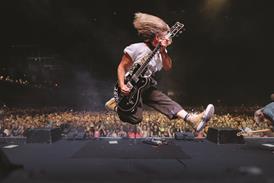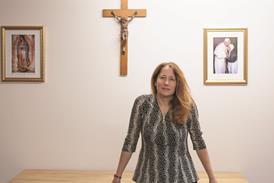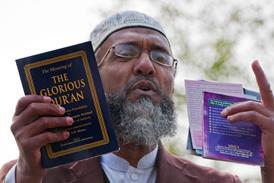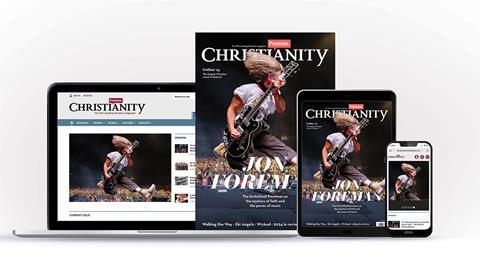Deja vu can strike at the strangest of times, but I suppose it’s understandable that I had it sitting opposite Steve Chalke in a TV studio, complete with autocues, clip mics comfy chairs and glasses of water, even though we’d never met before.
In the 90s Chalke was a regular fixture on talk shows and debates as well as news and current affairs programmes. He even presented several of his own series. There was a time when you could turn on the TV and be guaranteed to see him before long. In one sense, he was the 90s’ answer to Graham Norton – almost inescapable.
But if you don’t remember those halcyon days, the chances are you’ve still come across him – by reading one of his books, hearing him at Spring Harvest, or reading his column in this magazine.
With the exception of the Archbishops of Canterbury, York and Westminster; Chalke is possibly the UK’s most influential church leader. Having founded Oasis, he helped create Faithworks, Parentalk and Stop The Traffik. It’s his work in the latter organisation that led to him being appointed as UN special advisor on human trafficking. He regularly meets politicians, business leaders and those of other faiths.
Having written more than 30 books, controversy arose in 2003. The Lost Message of Jesus, co-authored by Chalke, featured a view of penal substitution which upset many conservative evangelicals. The debates sparked by that publication are still ongoing with the likes of Tom Wright and John Piper publicly discussing the nature of justification. What the lasting effects of the controversy have been on his ministry and the church as a whole depends on who you speak to. But Chalke is keen to highlight the support he received: ‘One of the great things that happened to me, the really great outcome of it, is that Christians around the world from other schools, you know, Orthodox, Catholic and mainstream churches, all embraced me and started to ask me to come and speak at things round the world.’
So, if you’re a UK-based Christian you’re likely to know something about Steve Chalke. You may know him rather well. But do you know it all? I suspect not, because as we began, I didn’t know the half of it…
Tell us about your upbringing.
I grew up in South London and still live in South London. I’ve lived my whole life there really. I’m the son of an Indian father and an English mother, so when I was a kid they used to call me a ‘halfcaste’. I lived in a very white South London and actually my dad was the darkest person I’d ever met and my colour of skin made me the darkest kid in my classroom. It was a London filled with racial prejudice which made it hard for my dad to find work. It was that beginning in South London that I think has been the bedrock foundation of a lot of my passions.
How did you come to faith?
I went to a school that was a bit of a ‘dump’ school. It was the kind of school that you went to if you were thick and not rich. I was on the free school dinner list and all of those kind of things. I fell in love with a girl who didn’t go to the school. This is my kind of redemption really! She went to the posh school for kids that had passed the 11-plus. I started going to a youth club at a church, in order to see her. I went along week after week to this thing before I worked out that she didn’t like me! Her name was Mary, she was 15, I was 14. She never would like me; she didn’t fancy me; it was all over before it had started.
[I was] wandering up the side of Selhurst Park, which is where Crystal Palace play football, and I remember thinking: ‘What’s the point of going to this youth club if Mary doesn’t like me?’ And then I thought, a most amazing thought for me: ‘Even if Mary doesn’t like me, the message they tell me at that church youth group about who I am is a lot better than the message that they tell me at the school. At school they tell me, basically I’ll have to work with my hands and that I’ve not got a brain. But at the church they tell me I’m made in God’s image, my life’s got potential.’
And wandering up the side of Palace football ground, I decided I was going to keep going to the church, I was going to be a Christian and spend the rest of my life telling people about Jesus and when I grew up I was going to set up a hostel for homeless young people, a hospital and a school for people who were poor who weren’t given opportunities.
That night my mum was sitting there when I got in and she said, ‘Have you had a nice evening?’ And I said, ‘Yeah I have. I think I’ve become a Christian. I’m going to spend the rest of my life telling people about Jesus anyway, and I’m going to set up a hostel, hospital and a school.’ And my mum said, ‘Very nice!’ which was the only bit of careers advice that I’d ever got!
Could you have imagined the scale to which Oasis and all the other ministries have grown?
No, and I hope that now, at the age of 54, I still can’t imagine the size to which things will grow. Not because I think being big is important at all, but I think we’re here to make an impact. Jesus said, ‘Go to the whole world.’ Everybody should have an opportunity of not just hearing about but seeing God’s love in action in their community. That night – it was an October night when I was 14 – was a gift from God. Because I’ve subsequently learnt through life, you cannot invent a sense of direction if it’s not actually given to you. It’s a gift. You don’t deserve it, it’s not a virtue that you have in any sense. I was given that gift of a sense of purpose by God.
If you invent a meaning for yourself, actually, when it gets cold, when it gets lonely, when people are against you, when the funding runs out, when the volunteers don’t show up, when it’s the bitter cold of winter – in the end, when you’re tired, you will give up. You cannot manufacture this, but I’ve never one day in my life thought, ‘This didn’t happen.’ It’s been this constant motivation and thrust point and encouragement point, so an extraordinary gift.
You’ve been appointed as UN special advisor on community action against human trafficking. How did that come about?
As Oasis grew around the world, we were working in more and more countries where we were running education for young people. All our academies are in poor communities. Kids would come for a while and then disappear. Slowly we worked out that some of these kids were just gone – they were being stolen or sold. There were two particular kids in the city of Mumbai in India, a 5-yearold and a 7-year-old who were fantastic little kids. One day they didn’t come to the class. The next day they didn’t come, and a guy called Phil, who still works for Stop The Traffik (STT) now, went to try and find them and discovered they’d both been sold. We know they’d either been sold for sex, sacrifice, [or] body parts.
Out of that, we began to say, ‘We’ve got to tackle this issue.’ Then slowly the STT thing grew and we realised that this had to be bigger than Oasis and it needed to be a worldwide coalition. It’s now in 50 to 60 countries, we’ve got thousands of member groups. The UN eventually approached me and asked me if I would be their advisor on how to mobilise communities against the evil of people trafficking which is job I’ve had for the last two years now.
Are you able to make a dent in this or is it a massive mountain?
It’s a massive mountain, but not only can we make a dent, we can really dent this thing. Evil reasserts itself in every generation. There’s always someone who wants to make a buck. In the case of people trafficking it’s 40 billion bucks a year. As much profit as the Microsoft empire according to the UN.
Do you see that as almost demonic then?
Yes, I think it is evil. In Ephesians Paul says, ‘We don’t wrestle against flesh and blood, but we wrestle against principalities and powers.’ We wrestle against evil systems. We wrestle against regimes and structures that are set up opposed to human freedoms and human dignity and the fact that we’re all made in God’s image.
Can I move you on to one of the controversies? The book that you wrote a couple of years ago that sparked a dispute on atonement. How do you look back on that now?
I said what I believe. I said actually what the majority of Christians have believed – not only through history, but the majority of Christians alive today. I said something that runs against the grain of what is believed by some evangelical Christians. It was presented as ‘Steve Chalke doesn’t believe in the cross,’ which is not at all true. I do believe in the cross and the resurrection and what Christ did for us there. I think it’s so important. I don’t think it’s a point of marginal theology. Other people have said to me that it’s a technical point that I was raising. It wasn’t a technical point at all. It was a point about what kind of God we worship. And how does God operate? What’s our mission in the world and how do we relate to the world?
Is there any regret over the specific phrase that’s causing this argument? You described God as a ‘cosmic child abuser’.
Well no, I didn’t. What I actually say in the book is that there is a view about what happened on the cross that makes God seem like a ‘cosmic child abuser’. If you’ve got an angry God who has to vent his wrath on us, or get Jesus instead: ‘Ha ha I’ve got Jesus, now I can let them off.’ And somehow Jesus changes God’s mood to us, he used to hate us and be wrathful to us and vengeful but now he can forgive us. I said if you believe that, that’s like believing that God is like some kind of cosmic child abuser – he abuses his own son, and then he lets us off. So I was saying the very opposite you see. Tragically there are people in the Church, who do, through the looseness of their words, keep that view alive.
You’re kind of outside the [political] process in a way so you can look at it and say what needs to happen. Would you ever consider getting inside the system?
I think I am inside the system...
Would you run for any kind of office then?
No. I was asked some years ago (I’m sure they asked lots of people!) to consider being a candidate for the London Mayor by one of the big political parties.
I was speaking at an event at Number 10 with Gordon Brown not so long ago and I said this: ‘Gordon, there must always be a tension in our relationship. In the Old Testament there was a tension between the king and the prophet. In the New Testament there’s a tension between John the Baptist and Herod.’
Everybody laughed because they thought I was calling him Herod! The prophet knows the king, but the prophet isn’t in the pocket of the king. We have to remember from the Old Testament that the prophet can get it wrong as well. It’s not like I know and they don’t. Actually truth is found in our relationship, so we’re friends but not friends to the point where we don’t challenge one another. So there’s a lot of rigour in the relationship.
Some people would be quite surprised to hear you describe your ministry as prophetic.
I would describe the Church as prophetic. I’m not claiming to be anything special myself. The Church is supposed to be a prophetic agency isn’t it? A prophetic movement.
But everyone’s not sitting in meetings with cabinet ministers. You are.
Yes, but I sit there on behalf of all the Christians working within Oasis, the thousands of staff we have who are changing communities, who are planting churches, who are working in classrooms. And it’s that that brings the power to sit in the boardroom if you see what I mean. We’re actually delivering and actually doing. The Church is a prophetic agency. If it’s not a prophetic agency, what is it? It’s a ‘nothingness’. Now I don’t see myself as in some special role, I just see myself as doing what I believe the Church should be doing.
What do you do to relax?
Years ago a strange thing happened to me. I was driving round the South Circular and I pulled into a garage to fill up my car with petrol and I remember standing there and it suddenly dawning on me. I was on my way home, I was working really hard, I was exhausted and I was going home to relax, and it suddenly hit me as I was filling my car up, ‘You’ve got life upside down mate.’ If I work hard at everything else, I’ve got to go home to work hard. And on that day I drove home and decided that I was not going to sit in a chair and say, ‘I’m home now, I’m off duty.’ I should work just as hard at being at home, when I was at home, as I would work at other things.
What do I do to relax? I run, I run a lot! While I was in the States working for the UN recently I ran the Chicago marathon. I knew I was going to be there while it was on, so I applied and ran it!
Do you realise how influential you are?
I think that if you are in the public eye in any way, your whole life needs to be the real thing instead of saying one thing and living another. Somebody once said the problem with lying is that you’ve got to have a very good memory. I learnt that I have to be authentically me and say what I think rather than pretend what I think. Christians have a different language for ‘in-church’ than ‘out of church.’ We use a certain kind of language that you can’t use in the big world. We talk about ‘ministry’ for instance. What does that mean? We ought to talk about ‘our work’. We talk about our theology and our doctrine and our beliefs in gobbledegook, and then we wonder why people can’t relate to it.
So much of my life is lived around media and Parliament. I need one language and one way of being instead of thinking, ‘Oh I’m in Christian company now so I’ll do this and say that.’ Also what I find is that I’ll be speaking at a Christian event and someone from government will come to listen to me. So I have one way of speaking, one set of views. I don’t have a set of views for ‘out there’ and another set of views for ‘in here’. I’ve learnt slowly to think through my faith and be able to talk about it, hopefully in a joined up fashion. I think that’s a big challenge ahead of the Church to ‘relanguage’ the gospel. Not to reinvent the gospel but to relanguage the good news of God in ways that make sense to every audience.
Biography
Rev Steve Chalke MBE was born in Croydon in 1955. He trained for the ministry at Spurgeon’s College and began youth work in Kent. In 1985 he set up Oasis which now employs more than 2,000 people. He’s a prolific author and speaker and is still a regular guest on TV and radio in the UK and elsewhere. Church.co.uk was founded by Chalke and now has several congregations. He holds the world record for the largest amount of sponsorship money raised from a single event when he raised £1.85million in the London Marathon. Married, with four grown-up children, he lives in London with his wife Cornelia. He has been on the leadership team of Spring Harvest for many years, and will step down this year.



























